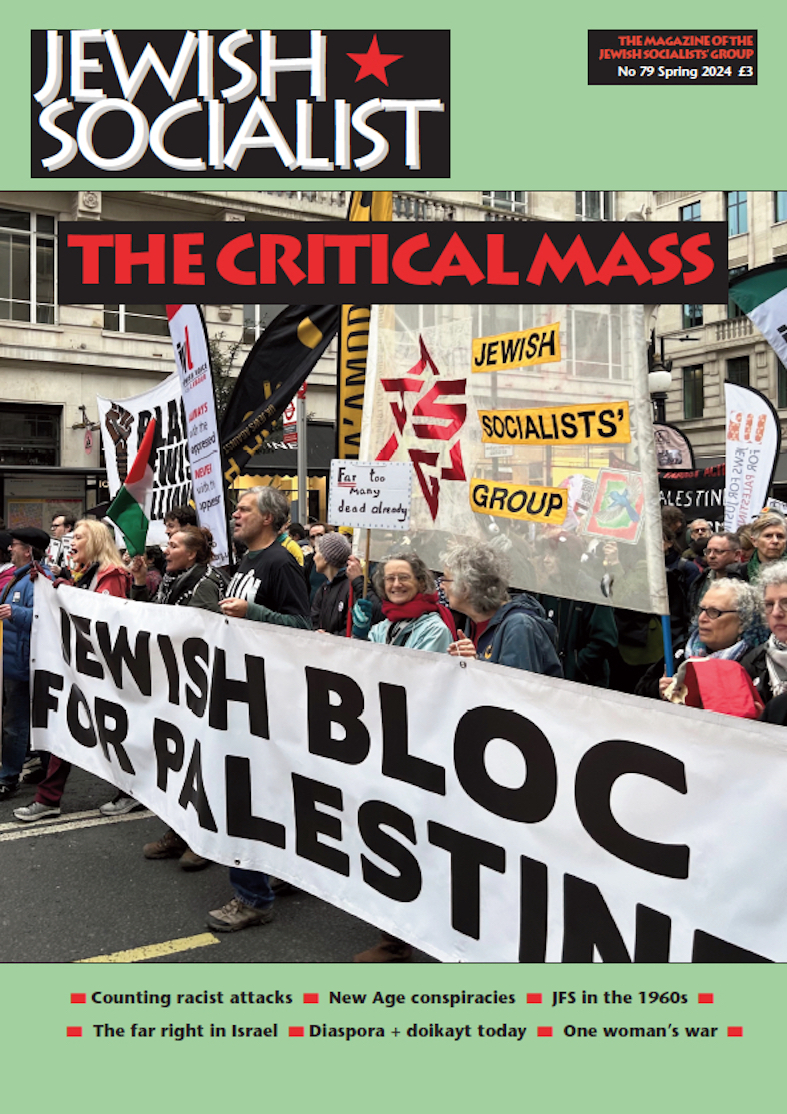Jewish Socialist 75 Editorial
Welcome to issue 75 of Jewish Socialist and apologies that you have had to pay more for this copy. For the first time in many years, we have reluctantly had to raise our prices to cover increasing costs – especially postage – but we hope that when you read it, you will agree it is value for money!
Fruits of revolution. The pandemic has challenged all sections of society to adapt their practices, including campaigning organisations of the Left, who have discovered Zoom – the capitalists’ best kept secret! Suddenly, we could invite people from other parts of the world to convey their experiences and analyses directly and instantly at our meetings.
In January this year, in the same week that Trump was ousted from office, we held a Jewish Socialists’ Group (JSG) Zoom meeting that gave a voice to four young Jewish radicals from the USA, talking and engaging in discussion with us directly (report p5)
In June, the JSG held its Annual Conference for members on Zoom. The first half of 2021 had already been explosive in Israel/Palestine. We saw: mass resistance by Palestinians to attempted land grabs and evictions at Sheikh Jarrah; pogrom-style attacks by the Israeli far right on Palestinian shops and individuals in Israeli towns; brutality by Israeli police against worshippers at Al Aqsa; and the devastating 11-day bombing of Gaza. Israeli officials claimed that this bombing was targeting “militants”, though it killed children and health workers, and destroyed medical facilities and journalists’ offices. Of the 248 Palestinians killed, 66 were children. There have been joint protests by Israeli Jews and Palestinians against far-right incitement, and also weekly protests by politically diverse Israelis that aimed to force Netanyahu from office and make him stand trial on corruption charges.
A quiet revolution. In January 2021 there was a bloodless but immensely powerful event. Israel’s most longstanding and widely respected human rights body, B’Tselem, declared that Israeli rule from “the Jordan River to the Mediterranean Sea” – that is within both the Green Line and the Occupied Territories – is guided by principles and practices of Jewish supremacy that come under internationally recognised definitions of apartheid.
Many Palestinians shrugged. They had long applied this designation to the actions of their colonisers and occupiers, but the reverberations within Israeli society, and perhaps even more importantly, among supporters and critics of Israel outside, are still being felt very powerfully. A threshold has been crossed. A survey in Israel found that 25% of Israeli Jews regarded Israel as an apartheid state (though we don’t know how many of them approved or disapproved of this designation). A survey among American Jews found that the same proportion there regard Israel as an apartheid state. In further analysis of the American survey by age group, this figure leaps to 38% among those under 40.
Through Zoom we were able to bring that debate directly and unmediated to our members, with talks and discussions led by Roy Yellin of B’Tselem and Rachel Beitarie of the radical Israeli NGO, Zochrot. And here, In Jewish Socialist we present their insights and analysis to you about how a future based on freedom and equality for all can be built (p7)
At our Annual Conference we passed a resolution calling on the group to undertake activities to boost our internationalist cooperation. We are very aware of an expanding number of radical Jewish initiatives and activities in different countries in recent years, and how much that reflects the philosophies of Bundism and its diasporist concept of “doikayt” (“here-ness”). As Israel moves further to the right, and more people are consciously exploring alternatives, David Rosenberg shows how relevant and useful those older Bundist concepts can be in 2021 (p20), while Michael Zylberman shows how a section of Jews in Melbourne never departed from these ideas, and are experiencing renewed enthusiasm for them (p22).
Here in Britain, the newer, radical Jewish initiatives are found within jewdas, Jewish Solidarity Action, Na’amod, XR Jews and Vashti media. Three of these are referenced by Aviah Day, a young Black Jewish activist committed to intersectional analysis and organising, who we have been fortunate to interview for this issue (p15). She is prominent in the current urgent campaign against the Tory government’s dangerous and wide-ranging Policing, Courts and Sentencing Bill, which strikes at the very right to protest.
There is no doubt that the Right have a grip on political power in Britain, and give succour to right-wing, Jewish establishment bodies that unflinchingly support the Israeli government of the day. But a pillar of the attempt by these bodies to label, target and delegitimise their political opponents – the IHRA Working Definition of Antisemitism, with its controversial set of examples – has been critically weakened in another quiet revolution. That definition, which seems more concerned with defence of Israel and Zionism than in combating antisemitism, has been dressed up as the international definition of antisemitism, and defended as such by mainstream media. But it has been a tool for demonising left-wing opponents and outlawing free speech on Palestine.
In March this year an international group of scholars in the fields of Holocaust history, Jewish studies, and Middle East studies published the Jerusalem Declaration on Antisemitism (JDA) which provides clear guidance for identifying and fighting antisemitism, while crucially protecting free expression. Julia Bard’s article offers a detailed analysis of the JDA and indicates how it can be used to challenge the IHRA hegemony for the benefit of the fight against all racism and in defence of human rights (p11).
We hope you enjoy reading this issue!
Posted: 3 August 2021 | Published in: Jewish Socialist No 75
Events
- JOIN THE JEWISH BLOC ON THE GAZA PROTEST
13 April 2024, London
March with the Jewish Bloc for Palestine at this week's London and South East demonstration for Gaza.
Jewish Socialist magazine
JS79 out now:
Counting racist attacks
New Age conspiracies
The far right in Israel
Diaspora + doikayt today

